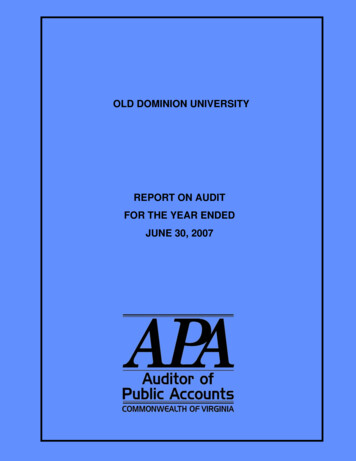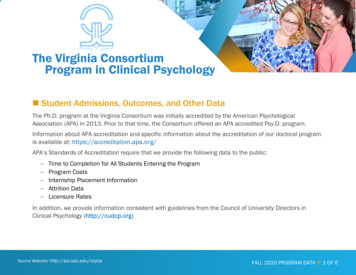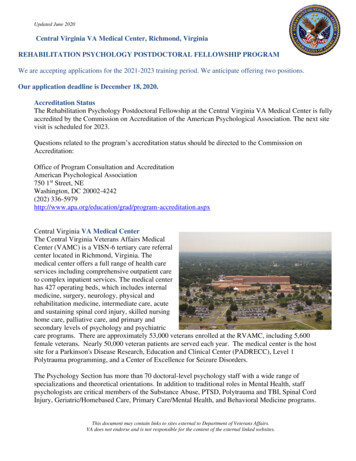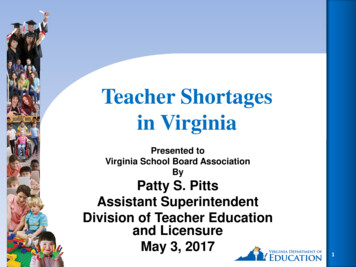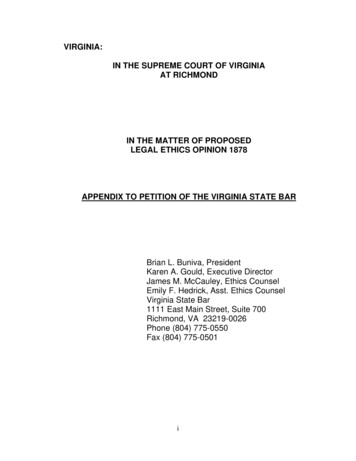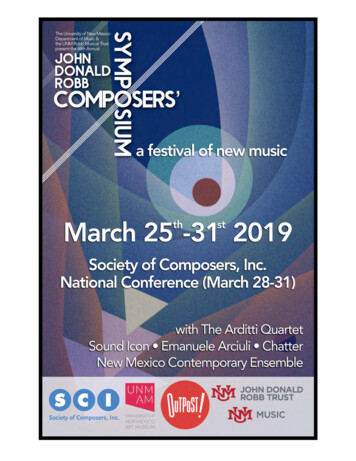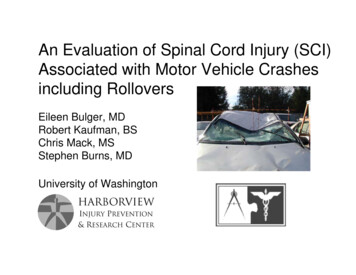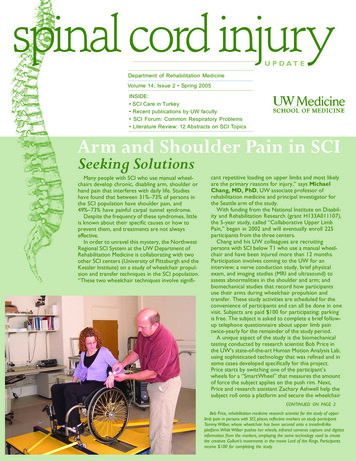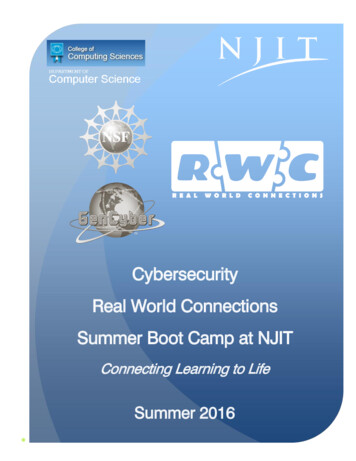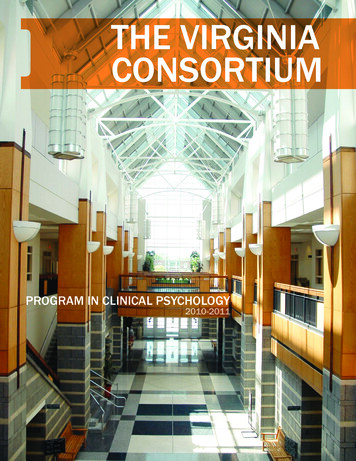
Transcription
The VirginiaConsortiumprogram in Clinical psychology2010-2011
The Virginia Consortium is one, unified program offeredjointly by three schools. To answer frequently asked questions about our innovative arrangement, the following sectionpresents the unique features of this program in terms of itsorigin, organization, resources and standards.Sponsored byEastern Virginia Medical SchoolNorfolk State UniversityOld Dominion University
The State Council of Higher Education for Virginia (SCHEV) has promotedconsortia in education to increase cooperation and reduce duplication of programs across institutions. When SCHEV authorized the Virginia Consortium,it authorized one program, with one degree, to be awarded jointly.The degree of Doctor of Psychology in Clinical Psychology (Psy.D.) is offeredthrough this consortial program. The program is jointly sponsored by EasternVirginia Medical School, Norfolk State University, and Old Dominion University, and isadministered by the Virginia Consortium, a cooperative interinstitutional mechanism for coordinating the resources of these supporting institutions.The Virginia Consortium is mosteasily understood as consisting of theresources of three institutions, organizedinto a single, unified program. Thisresults in resources greater in diversityand depth than are those available inintra-institutional programs.ORGANIZATIONStudents interact primarily with the Program’s Administrative Office. Admission, registration, and all other administrative functions are centralized. Onetranscript is maintained and one diploma is awarded. Courses, however, areoffered at all institutions on a schedule organized to minimize travel.Responsibility for the administration, planning, program development,and program implementation of the Virginia Consortium rests with the Councilof Directors. The Council is composed of one Director of Clinical PsychologyTraining from each of the consortial schools, appointed by the Provost of hisor her institution; and a student representative, elected by and responsible tothe students enrolled in the Program.From the student’s perspective, theVirginia Consortium Program hasbeen designed to be administrativelysimilar to a program within a singleinstitution.Standing committees have been formed to distribute program responsibilities beyond the Council and to ensure that supporting institutions arerepresented in the specific, task-oriented missions of the committees.Recruitment and Admission Committee (RAC) develops and maintainsprocedures for student admission in accordance with the Program’s admission policies. Its members review applicants and make recommendations to the Council inthe form of a rank ordered list of acceptable candidates.Comprehensive Examination Committee (CEC) administers the written and oral comprehensive examination to students, typically at the end ofthe fifth semester of training. The examination assesses ethical, research, andclinical competence to confirm readiness for internship.RESOURCESThe Program’s consortial arrangement provides students with a large array ofdiverse resources. Students are considered to be full-time students at each ofthe three institutions simultaneously and are entitled to the same rights andprivileges as any other full-time student at each. Therefore, each student has fullaccess to three libraries, three resources for financial aid, three sets of studentservices, and any other resources or facilities that the student may choose toaccess. Approximately 20 full-time faculty of the sponsoring departments areregularly involved in the Program which serves about 25 students.Approximately 20 full-time faculty ofthe three sponsoring departmentsare regularly involved in the Programwhich serves about 25 students.Students have access to the remaining full-time faculty for individual study,dissertation committees, and other training activities. In addition, more than 60supervisors in over 30 community agencies participate in practicum training.STANDARDSBecause the diploma is awarded jointly, each institution must be able to stand behindthe entire consortial program, not just its own contributions. Therefore, each academicand administrative function has been reviewed and fully approved by the faculties andacademic administration at each of the three institutions. In every respect, the Programand its graduates meet all of the standards of the three accredited institutions.Each institution must be able to standbehind the entire consortial program.the virginia consortium1
sponsorsEastern Virginia Medical School (EVMS) is a community-based, statesupported, academic institution dedicated to medical and health education,biomedical research, and enhanced health care in Hampton Roads. Its programsare carried out through a series of cooperative arrangements involving the area’scities, hospitals, health professionals, and institutions of higher education.In addition to training medical professionals through its schools of Medicineand Health Professions, EVMS offers, through the Eastern Virginia GraduateSchool of Medicine, a variety of residencies in many different medical specialties, including its APA-approved clinical psychology internship, and post-doctoralfellowships in clinical neuropsychology and forensic psychology. In additionto the Virginia Consortium, there are 11 other health professions programssponsored by EVMS.Teaching faculty of the medical school are heavily engaged in patient care.EVMS Health Services provides world-class care across a variety of medicalspecialties, including clinical psychology and psychiatry. Special EVMS Centersof Excellence include the Clinical Research Unit of the Department of Pediatrics, the EVMS Strelitz Diabetes Center, the Jones Institute for ReproductiveMedicine, the Glennan Center for Geriatrics and Gerontology, the Sleep Disorders Center, and the Thomas R. Lee Center for Ocular Pharmacology. Facultyand students actively pursue individual and collaborative research investigations in both the biomedical and behavioral sciences.Responsibility for the institution’s support of the Virginia Consortium resideswithin the Department of Psychiatry and Behavioral Sciences, with a full-time faculty of 19, eight of whom are psychologists. The department provides comprehensiveoutpatient mental health services for children, adolescents, and adults. It alsosponsors a clinical psychology internship, two post-doctoral fellowship programs(in clinical neuropsychology and forensic psychology), a psychiatric residency program, and a graduate art therapy program. Specialized programs include The Neuropsychology Center and the Sleep Disorders Center. Within the Virginia Consortium, EVMS sponsors advanced training in clinical neuropsychology, and whenpossible, in sleep disorders or other areas.Norfolk State University (NSU) is the youngest of Virginia’s five historicallyBlack colleges and universities. It is now the largest HBCU in the Commonwealth,and is among the nation’s largest. Norfolk State’s mission is to provide an affordable, education for an ethnically and culturally diverse population, equipping graduates to contribute to the global society. Norfolk State has a studentpopulation nearing 7,000 and a faculty of 300.Norfolk State is a community-oriented university that was established tomeet the educational needs of the community, which were not met by othereducational institutions in the region. It is accredited by the Commission onColleges of the Southern Association of Colleges and Schoools (SACS). Itsacademic departments are housed within eight schools, with the PsychologyDepartment in the School of Liberal Arts.Norfolk State has gained the status of a doctoral degree-granting institution in the Commonwealth’s higher education system. In addition to the Psy.D.program offered through the Virginia Consortium, Norfolk State offers twoother doctoral degree programs and others in the natural sciences are beingdeveloped. In addition, the university offers two associate degrees, 32 bachelor’s degrees, and 16 master’s degrees.2The Psychology Department with nine full-time faculty members has over300 undergraduate majors. The Department offers a master’s degree in community/clinical psychology. Norfolk State shares the administration and curricular offerings of the Virginia Consortium Program.
Old Dominion University (ODU) is afour-year institution with an enrollment of241,000 students. While its principal enrollment campus is in Norfolk, Old Dominionalso has higher education centers in VirginiaBeach, Hampton, and Portsmouth, and morethan 40 Teletechnet (distance learning) sites in Virginia andseveral other states.Old Dominion is recognized as one of Virginia’s leadingdoctoral research institutions. The total value of ODU’s facultyresearch amounted to 96.2 million in FY 2009. According tothe National Science Foundation, 18 ODU programs are rankedamong the top 100 of their respective national peers in termsof R&D expenditures. The university is ranked 61st in totalR&D expenditures among institutions without affiliated medical schools, 79th in DOD research, and 51st in NASA research.ODU is classified as a Carnegie Research Institution with highresearch activiity.Old Dominion University is committed to providing studentsand the community with a global perspective through academicprograms, research, faculty development and community outreach. Old Dominion serves a diverse student body, includingmore than 1,400 international students from 108 countries.Nine foreign languages, a variety of degree programs in international studies and several study abroad programs are offered atODU.The 23-member psychology department offers programsleading to the bachelor of science, the master of science, thedoctor of philosophy in Applied Experimental Psychology, HumanFactors Psychology, and Industrial-Organizational Psychology,and the doctor of psychology in clinical psychology through theVirginia Consortium. The department also contributes to theM.S. and Ph.D. programs in modeling and simulation.The psychology department is part of the College of Sciences which also includes the traditional departments of science, as well as the Department of Computer Science and theDepartment of Mathematics and Statistics. Old Dominion offersa total of 70 baccalaureate programs, 59 master’s programs,and 41 doctoral programs.Old Dominion’s Perry Library is fully automated and itsmore than 3.3 million items are listed in the on-line catalog.The computer center, which operates a network of computingterminals throughout campus, provides a wide range of computing services for instruction, research and administration.the virginia consortium3
the areaHampton Roads is located approximately 90 miles east of Richmond, 180 miles southeast of Washington, D.C., and 330 milessouth of New York City. It is bounded on the east by the AtlanticOcean and on the west by the city of Suffolk.It is an area rich in history. Hampton Roads was first discovered four hundredyears ago in April 1607 when a landing party of English colonists touchedshore at Cape Henry and planted a wooden cross in the sand in thanksgiving for their safe passage. These first settlers later moved further inland toestablish America’s first permanent colony at Jamestown.The area quickly became prominent during the colonial period becauseits many rivers and waterways provided good transportation for exportation oftobacco. Today, these same waterways are responsible for much of the area’seconomic growth. The United States Navy was among the first to recognizeHampton Roads’ potential as a base for modern maritime operations. Thearrival of the Navy was soon followed by an increase in commercial shippingactivity in the area’s port facilities.During the Revolutionary War, the city of Norfolk was bombarded by LordDunmore’s fleet and burned by patriotic citizens to prevent the British fromusing the town as a base. In nearby Yorktown, the war was ended and USindependence won. During the Civil War, Hampton Roads was the settingfor the famous naval battle between the Monitor and the Merrimac.Today, Hampton Roads abounds in cultural and economic opportunity.Its seven cities -- Chesapeake, Hampton, Norfolk, Newport News, Portsmouth, Virginia Beach and Suffolk -- are unique in the quantity and varietyof outdoor recreational facilities they offer. Water sports are naturally verypopular; there are many beaches, fishing piers and boating facilities. Intown, there are many city parks in which activities ranging from swimmingto hiking to horseback riding are available. In the suburban areas, there areseveral championship golf courses as well as excellent tennis courts.The mission of the Virginia Consortium isto graduate clinical psychologists who are:competent in individual and cultural diversity;educated in the basic subjects and methods ofpsychological science; capable of critically assimilating and generating new knowledge; proficient in the delivery and evaluation of psychological services; and able to assume leadershippositions in health service delivery systems.MISSION AND EDUCATIONAL PHILOSOPHYIt is the Program’s philosophy that practicing clinical psychologists are besteducated as practitioner-scientists. Scientific knowledge and methods formthe foundation for effective clinical service. Although the objectives of the basic researcher and the clinical practitioner are different, productivity for bothinvolves articulating current problems and issues, formulating creative solutions to those problems, and validating hypotheses by systematically gatheringempirical evidence. Continuing professional development for both requiresthe discipline to critically appraise the scientific merits of new theoretical andempirical developments in the behavioral sciences.Education in research methodology in the Virginia Consortium is comprised of coursework, research assistantships, and an empirical dissertation.During the first two years of the curriculum, required courses in statistics,research design, and empirically-supported therapies prepare the student inthe fundamentals of research methodology. Research assistantships, available to students for the first two years supplement these courses by providingexperience in conducting research. In the third year, the student’s educationin research methodology culminates in a clinical dissertation, an empiricalstudy coordinated with the student’s chosen area of advanced study. By thesemeans the student develops the skill to critically appraise research literatureand evaluate psychological services.4
The clinical psychologist encounters a diversity of client populations andhuman problems. Implementation of effective services and programs requiresan understanding of the complex array of biological, psychological, and sociocultural factors affecting human behavior. Accordingly, the VCP curriculumcontains instruction in fundamental content areas of psychology. Those substantive areas include developmental, social, and physiological psychology.Personality theory, history and systems of psychology, and ethics are taught asseparate courses, also in clinical courses, and as an integral part of practicumtraining.In the Virginia Consortium, education and training in the delivery of psychological services progresses from generic to more specialized. During thefirst two years of the curriculum, the coordinated sequence of clinical coursesand practica are generic in content and theoretical orientation. The studentlearns the major theoretical and technical models. Though provisions are madefor individual interests, no theoretical model, intervention modality, or clientpopulation is pre-eminent in the basic education of the student.Advanced training is provided in the third year of the curriculum; the studentchooses an area of interest comprised of courses, practica, and an empiricaldissertation. A student may design an individualized curriculum by coordinatingresources approved by the Council of Directors.Clinical training for the Psy.D. degree is completed in a fourth year of clinicaltraining in preparation for internship, and then in a full-time internship duringthe fifth year of the Program.CLINICAL RESIDENCYIn each state, practice as a psychologist is governed by statute law; graduation from the doctoral program in clinical psychology does not by itself certifya person to practice as a psychologist. The program provides APA-accreditededucation and training for the doctorate. The respective states have additionalrequirements for license to practice.For further information, contact the state board(s) of psychology or the Association of State and Provincial Psychology Boards at the following address:P.O. Box 241245, Montgomery, AL 36124-1245; (phone) 334-832-4580; (fax)334-269-6379.CURRICULUM STRUCTUREThrough study of fundamental content areas and methodology, the studentacquires an understanding of the theoretical and conceptual organizationof psychological science and of the intellectual and empirical means for theacquisition of knowledge. Through study of assessment and individual, group,and family intervention, the student acquires the theoretical and technicalexpertise for the practical applications of psychology to the solution of humanproblems. Through the study of community systems, the student acquires theknowledge and skills necessary to effectively function in community servicedelivery organizations.Together, these courses define the generic section of the Virginia Consortium curriculum. Remaining are the third year of advanced training, during whichthe student pursues personal interests in greater depth through coursework,practica, and applied clinical research, and a fourth year of clinical practiceprior to internship.the virginia consortium5
PRACTICUM TRAININGDevelopment of clinical skills andcompetencies through supervisedexperience is a crucial componentof the Program.The Virginia Consortium Program provides a systematic sequence of supervised practica in which students apply the knowledge and skills acquired in theclassroom. Placements are arranged to assure that each student is exposedto several settings and populations.Practicum training is offered in a variety of diverse settings, including mentalhealth centers, medical hospitals, a veterans’ medical center, psychiatric hospitals,children’s residential treatment facilities, public school systems, university counseling centers, social services clinics, private practices, and two specialty services(neuropsychology/rehabilitation, and sleep disorders). Some practicum sites requirecriminal background checks and drug testing. Sites are subject to change.EARLY COURSEWORK AND PRACTICAThe student is enrolled in a practicum in each semester for four calendaryears. The first six practica consist of 8 hours per week of supervised clinicalexperience in an affiliated facility; the remaining practica are completed in 20hours per week.Practicum objectives correspond to the sequence of clinical courses. Forexample, the clinical courses in the first semester are clinical psychopathology and intellectual assessment. The practicum activities in the first semesterinclude interviewing, relationship building, mental status examination, historytaking, diagnosis, and administration, scoring and interpretation of ability andachievement tests. In the second semester, the clinical courses include personality, and the student continues practicum activities of the first semester andbegins individual intervention. In the same way, clinical courses in subsequentsemesters provide the foundation for additional practicum activities.This sequencing provides a systematic and cumulative approach to acquiring and rehearsing the core assessment and intervention skills expected ofa general clinical practitioner. The third year is designed to provide studentswith the opportunity to focus on an area of personal interest and to assumeincreased r
doctoral research institutions. The total value of ODU’s faculty research amounted to 96.2 million in FY 2009. According to the National Science Foundation, 18 ODU programs are ranked among the top 100 of their respective national peers in terms of R&a
